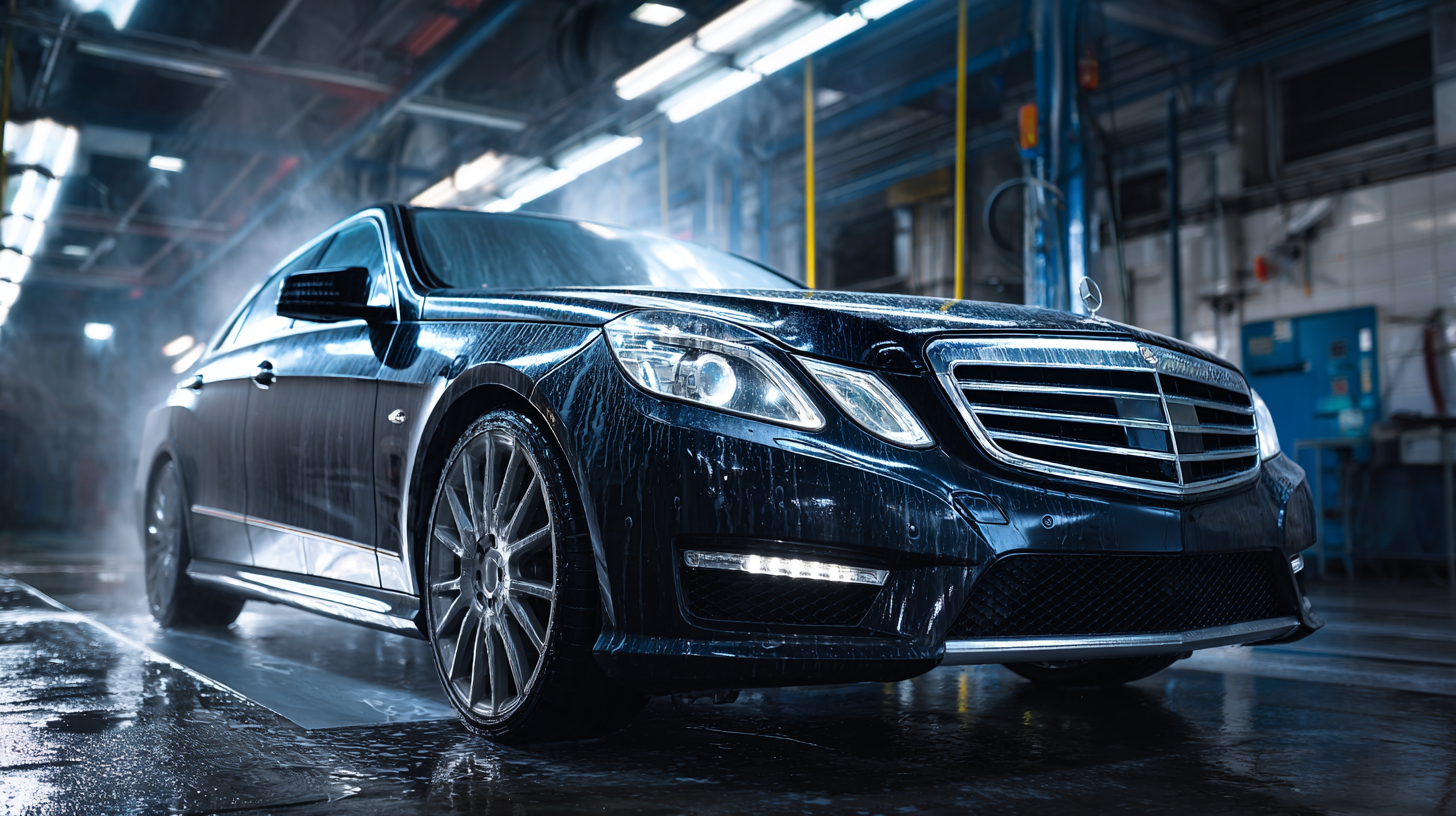Future-Proofing: The 2025 Market Outlook for the Best Industrial Car Wash Machines
As we approach 2025, the industrial landscape is rapidly evolving, and businesses in the car wash industry must adapt to stay competitive. The demand for efficient and high-performance industrial car wash machines is surging, driven by technological advancements and consumer expectations for superior service. This blog will explore key strategies for future-proofing your car wash operations, focusing on the best industrial car wash machines available in the market. From leveraging automation to enhancing sustainability practices, we will provide insights into the trends shaping the industry and how to select equipment that not only meets current needs but also anticipates future challenges. Join us as we delve into the essential factors that will define success in the coming years and discover how investing in the right industrial car wash machine can position your business for growth and resilience.

Overview of the Industrial Car Wash Machine Market Trends Leading to 2025
As we look towards 2025, the industrial car wash machine market is poised for significant changes, driven by evolving consumer expectations and technological advancements. The global high-pressure cleaner market is projected to reach a value of $2624.2 million by 2025, with a robust compound annual growth rate (CAGR) of 3.6% expected to propel it to $3482.3 million by 2033. This growth reflects a broader trend in the automotive care industry, where efficient, high-quality cleaning solutions are not just a luxury but a necessity for maintaining vehicle performance and aesthetics.
Moreover, the introduction of advanced technologies such as artificial intelligence in car washing systems is revolutionizing the industry. Automated car wash machines equipped with AI can identify vehicle types and adjust their operations accordingly, providing a tailored cleaning experience. This innovation not only enhances service efficiency but also ensures a meticulous approach to car care, addressing concerns like paint scratches and surface preservation effectively. As these trends unfold, businesses will need to adapt quickly to market demands, ensuring they are equipped with state-of-the-art technologies that align with future consumer preferences.
Future-Proofing: The 2025 Market Outlook for Industrial Car Wash Machines
Analyzing Key Performance Indicators of Industrial Car Wash Machines in 2025
As we look towards 2025, understanding the key performance indicators (KPIs) of industrial car wash machines will be crucial for businesses aiming to stay competitive. According to a recent market analysis by IBISWorld, the industrial car wash industry is projected to grow at a compound annual growth rate (CAGR) of 3.5%, highlighting the increasing demand for efficient cleaning solutions. Therefore, key metrics such as water and energy consumption, cleaning speed, and reliability will be essential for evaluating the performance of these machines.
When assessing industrial car wash machines, businesses should pay close attention to their water usage efficiency. Reports indicate that advanced machines can reduce water consumption by up to 50%, making them not only environmentally friendly but also cost-effective in the long run. Another critical KPI is the cleaning speed, where machines with enhanced technology can wash a vehicle in as little as 5 minutes. This efficiency can significantly boost throughput and overall profitability.
Tip: To optimize the selection of an industrial car wash machine, consider investing in models with integrated smart technology that can provide real-time performance data. This insight allows operators to make informed decisions, ensuring operational efficiency and maintenance optimization, which is vital in an increasingly competitive market.
Challenges Facing Industrial Car Wash Machines and Their Solutions
The industrial car wash sector faces a multitude of challenges as it adapts to a rapidly changing market environment. One significant issue is the increasing demand for water conservation and environmentally friendly solutions. As regulations tighten and consumer awareness grows, traditional car wash machines must evolve to utilize less water while maintaining high cleaning standards. Manufacturers are responding by engineering advanced systems that recycle water and use biodegradable detergents, thereby meeting both regulatory requirements and consumer expectations.
Additionally, the rise of automation and digital technology presents both an opportunity and a challenge for industrial car wash operators. While automated systems can enhance efficiency and reduce labor costs, they require significant upfront investment and ongoing maintenance. To address these concerns, many players in the market are exploring modular designs that allow operators to upgrade their machines gradually, ensuring they remain competitive without overwhelming their budgets. Innovations in machine learning and AI are also aiding in predictive maintenance, allowing businesses to anticipate issues before they become costly repairs, ultimately contributing to a more sustainable operational model.
| Aspect | Current Trends | Challenges | Proposed Solutions |
|---|---|---|---|
| Technology Integration | Increased automation and AI integration | Resistance to change from traditional methods | Training programs and pilot projects |
| Environmental Regulations | Stricter laws on water usage and runoff | Compliance costs and technology upgrades | Invest in eco-friendly technology |
| Consumer Preferences | Demand for quicker, more efficient services | Balancing speed with quality | Adoption of advanced cleaning technologies |
| Economic Factors | Fluctuating fuel and utility costs | Budget constraints affecting upgrades | Cost-benefit analysis before major projects |
| Market Competition | Emergence of new players with innovative solutions | Pricing wars and service differentiation | Focus on unique selling propositions |
Technological Innovations Shaping the Future of Car Wash Equipment
As we look ahead to 2025, the market for industrial car wash machines is being significantly reshaped by technological innovations. Key advancements such as automated wash systems, water recycling technologies, and smart management software are revolutionizing the car wash industry. According to a recent report by IBISWorld, the industrial car wash industry is projected to grow by 4.2% annually, fueled by increasing demand for efficiency and eco-friendly solutions. These innovations not only enhance operational efficiency but also minimize environmental impact, catering to both business and consumer preferences for sustainability.
One of the most promising trends is the incorporation of IoT (Internet of Things) technology into car wash systems. This enables real-time monitoring and data analysis, allowing operators to optimize water usage and manage energy consumption effectively. Implementing such technologies can lead to a reduction in operational costs by up to 30%, revealing a substantial opportunity for car wash businesses.
**Tip:** When investing in new car wash machines, consider options that offer modular upgrades. This flexibility allows businesses to adapt to future technological advancements without requiring a complete system overhaul.
Moreover, the integration of contactless payment systems and mobile apps enhances customer convenience, encouraging loyalty and repeat visits. A survey by Statista indicates that 63% of consumers prefer car wash services that provide digital payment options, emphasizing the need for operators to adopt these technologies to stay competitive.
**Tip:** Regularly update your car wash's software systems to ensure you are leveraging the latest features and maintaining compliance with industry standards.

Sustainability and Environmental Regulations Impacting the Car Wash Industry
As the car wash industry gears up for the challenges and opportunities of 2025, sustainability and environmental regulations play pivotal roles in shaping the future landscape. According to a recent report from IBISWorld, the implementation of eco-friendly practices within the car wash sector has surged over the past few years, with over 50% of car washes now adopting water reclamation systems. This is not just a trend; it reflects growing consumer demand for environmentally responsible services. In fact, research indicates that 78% of consumers prefer to patronize businesses that demonstrate a commitment to sustainability.

Moreover, stringent environmental regulations are driving technological innovations in car wash machinery. For instance, the EPA's Clean Water Act has encouraged many car wash operators to invest in equipment that reduces wastewater discharge by 30-50%. Furthermore, a recent study revealed that incorporating biodegradable soaps and waxes can enhance a car wash's eco-friendliness while improving customer satisfaction. As car wash owners look to future-proof their operations, aligning with these sustainability initiatives will not only be a compliance issue but a strategic advantage in attracting eco-conscious consumers and improving overall operational efficiency.